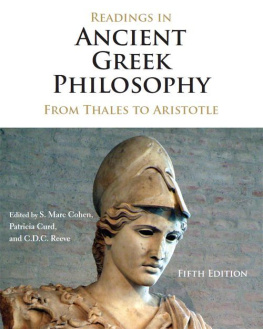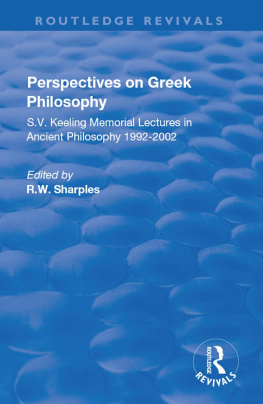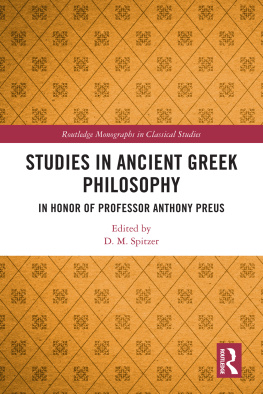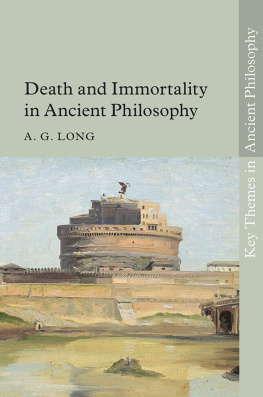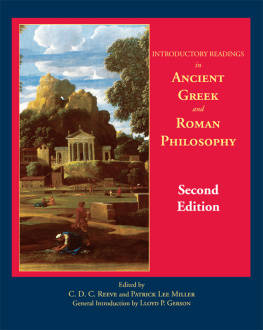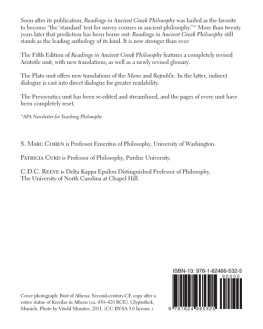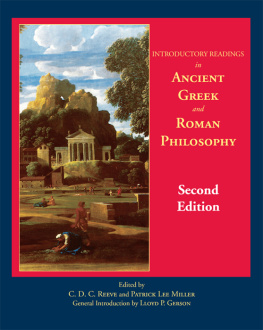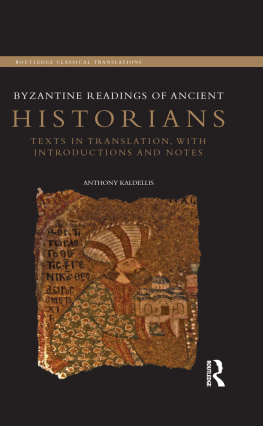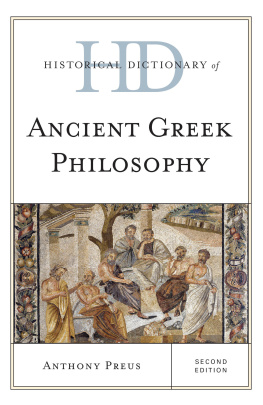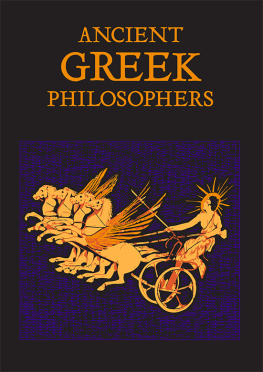R EADINGS IN A NCIENT
G REEK P HILOSOPHY
F ROM T HALES TO A RISTOTLE
FIFTH EDITION
R EADINGS IN A NCIENT
G REEK P HILOSOPHY
F ROM T HALES TO A RISTOTLE
FIFTH EDITION
Edited by
S. Marc Cohen, Patricia Curd, and C.D.C. Reeve
Hackett Publishing Company, Inc.
Indianapolis/Cambridge
Copyright 2016 by Hackett Publishing Company, Inc.
All rights reserved
Printed in the United States of America
19 18 17 16 1 2 3 4 5 6 7
For further information, please address
Hackett Publishing Company, Inc.
P.O. Box 44937
Indianapolis, Indiana 46244-0937
www.hackettpublishing.com
Cover design by Brian Rak
Interior design by Meera Dash
Composition by Aptara, Inc.
Library of Congress Cataloging-in-Publication Data
Names: Cohen, S. Marc, editor. | Curd, Patricia, 1949- editor. | Reeve, C. D. C., 1948 editor.
Title: Readings in ancient Greek philosophy : from Thales to Aristotle/edited by S. Marc Cohen, Patricia Curd, and C.D.C. Reeve.
Description: Fifth Edition. | Indianapolis : Hackett Publishing Co., Inc.,
2016. | Includes bibliographical references.
Identifiers: LCCN 2016010801| ISBN 9781624665325 (pbk.) | ISBN 9781624665332 (cloth)
Subjects: LCSH: Philosophy, Ancient.
Classification: LCC B171 .R39 2016 | DDC 180dc23
LC record available at https://lccn.loc.gov/2016010801
PRC ISBN: 978-1-62466-595-0
Hellenistic Philosophy: Introductory Readings, Second Edition . Edited and Translated by Brad Inwood and Lloyd P. Gerson.
C ONTENTS
The page numbers in curly braces {} correspond to the print edition of this title.
Appendixes
Except where noted, translations of the Presocratics and Sophists are by Richard D. McKirahan
{viii}
This anthology is intended to introduce readers to a broad selection of the writings of some of the greatest of the ancient Greek philosophersHeraclitus, Parmenides, Democritus, Protagoras, Plato, Aristotle, and many others. Together these thinkers brought about one of the most significant revolutions we know of, one that set the Western world on a path thatwith minor and not so minor deviationsit has followed ever since. What they did, to put it boldly and oversimply, was to invent critical rationality and embody it in a tradition; for the theories they advanced, whether on the nature and origins of the cosmos or on ethics and politics, were not offered as gospels to be accepted on divine or human authority but as rational products to be accepted or rejected on the basis of evidence and argument: do not listen to me, Heraclitus says, but to my account. Every university and college, every intellectual discipline and scientific advance, every step toward freedom and away from ignorance, superstition, and enslavement to repressive dogma is eloquent testimony to the power of their invention. If they had not existed, our world would not exist.
Obviously, there is more to say about the achievements of Greek philosophy than this. But bold and oversimple as our claim is, and standing in need of modification and elaboration as it does, it points nonetheless to something central and vital, something that will surely be borne in upon any reader of the texts collected here: the world of Greek philosophy is an argumentative world.
As we weigh and consider the ideas and evaluate the arguments contained in the following pages, we will find ourselves thinking about the ultimate structure of reality, about the mind, about the nature of knowledge and scientific theorizing, about ethical values, and about the best kind of society for people to live in. Some of what we uncover we will no doubt find congenial; some we will want to criticize or reject. But as long as evidence and argument remain our touchstone, we will be joining in the enterprise that these philosophers both invented and did so much to develop. In the process, we will be to some degree becoming what some of them thought was the best thing to befully rational human beings.
This may sound attractive, but it may also seem one-sided, so it is perhaps important to add that the critical rationality vital to successful theorizing, while it is recommended as a crucial ingredient in the best kind of life, is certainly not all that is recommended to us by these philosophers. For many of them, a successful life is one in which all the elements in our charactersneeds, desires, emotions, and beliefsare harmoniously integrated and in which we ourselves are harmoniously integrated with others into a flourishing society that is itself in harmony with the larger world of which it is a part. Moreover, many of the Greek philosopherslike their fellow poets and tragediansrecognized that there were profoundly nonrational elements in the world: the same Heraclitus who asks us to listen to his account also reminds us that the Lord whose oracle is at Delphi neither speaks nor conceals, but gives a sign; Socrates, the patron saint of rational self-scrutiny, is also a servant of the god Apollo. Indeed, one of the most attractive features of Greek philosophy is its inclusivity, its manifest wish to see the world whole and see it right. Few contemporary philosophers offer us such all-encompassing visions of ourselves and our world as we find in Plato and Aristotle; few have the audacity to reach as far or as wide as the great Presocratics. That is not, surely, the only reason to make friends with these splendid thinkers, but it is, nonetheless, one major reason why they have never lost their power to challenge, inspire, and enlighten those who do befriend them.
We have divided the selection of readings into three sections, each with a separate introduction. Patricia Curd is primarily responsible for the section on the Presocratics and Sophists; {ix} David Reeve for the section on Plato; and Marc Cohen for the section on Aristotle. An excellent anthology of later Greek philosophical writers that nicely complements this one is B. Inwood and L. P. Gerson (eds.), Hellenistic Philosophy: Introductory Readings , second edition (Indianapolis: Hackett, 1997).
The fifth edition of Readings in Ancient Greek Philosophy features an extensive revision in the Plato and Aristotle units, which had been untouched since the appearance of the first edition in 1995. In the Plato unit, the translations of the Meno and Republic are new, and in the Aristotle unit virtually all the translations are new, and were either prepared especially for this volume or extracted from complete translations recently published or forthcoming from Hackett. There have also been extensive additions to the excerpts from Aristotles works. In particular, we have added Topics I.1, 4; De Anima II.67; Metaphysics VI.12, VII.78, 12, VIII.3, IX.6, XII.45, 10, and XIII.10; Nicomachean Ethics II.7, 9, III.10, V.5, 10, VI.3, 6, 89, 11, IX.8, and X.1, 45; and Politics I.36, 810, 13, and III.23, 5. The Glossary for Aristotle has also been entirely revised and rewritten.
To make room for this expansion of the selections from Aristotle, we have deleted two chapters ( Met . XII.8 and Pol . III.11) that were deemed less important to include in this book. The unit on the Presocratics and the Sophists has also been streamlined in a way that will still leave ample material for thorough coverage of these philosophers as they are treated in typical junior and senior level courses in ancient Greek philosophy. While the selections in the Plato unit remain unchanged, the Meno and the Republic appear in new translations.
The entire book has been reformatted with two columns of text per page, making it easier to read and using space more efficiently.
References to the Greek philosophers make use of certain standard editions of their works. Thus references to the Presocratics employ Diels-Kranz numbers because H. Diels and W. Kranz, Die Fragmente der Vorsokratiker (1903) was the first authoritative collection of Presocratic texts. Testimonia about a philosopher written by someone else are identified by the letter A, and fragments of the philosophers own works by the letter B. 22A2, for instance, refers to the second of the testimonia listed on Heraclitus, to whom the number 22 is assigned; 28B1 refers to the first fragment of Parmenides. References to Plato are to the edition of his works produced by Henri Estienne (known as Stephanus) in 1578, and are given by title and Stephanus page number (e.g., Republic 464d). References to Aristotle are to Immanuel Bekkers edition (1831) and are given by title and Bekker page and line number (e.g., Politics 1252a10). Asterisks in the translations of Aristotles works mark places where the Greek text being translated deviates from that in the standard (usually OCT) edition. Details about these textual deviations are provided in the Notes on the Text of Aristotle at the end of the book, where they are listed by Bekker number.
Next page
